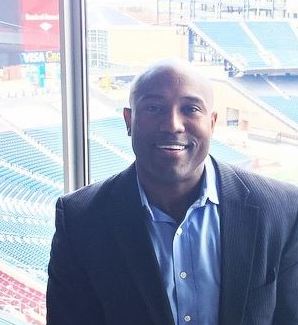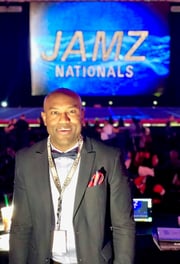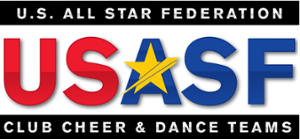Discussing Race and Diversity in All Star
September 16, 2020 | David Sims
September 16, 2020 | David Sims

USASF is committed to cultivating and preserving a culture of diversity, equity, inclusion, sensitivity and connectedness in All Star. Longtime USASF Member and contributor, David Sims, recently participated in a virtual call hosted by USASF with other members about Diversity, Equity and Inclusion.
His insights and experiences helped guide the conversation and USASF’s steps moving forward in efforts to find and address areas of improvement related to inclusivity, equity and diversity. We asked David to answer a few questions to give you a sneak peek into that call as well as advice for parents and athletes on discussing race and diversity related to All Star.
Q: [USASF] The Positive Coaching Alliance suggests that sport can be an incredible vehicle for change in response to addressing Diversity, Equity and Inclusion. As a longtime member of not only the All Star Community but also the USASF, what are some suggestions you have for using the platform that All Star provides to invite the opportunity for change?
A: [David Sims] The power of sports is an amazing tool to not only put a spotlight on Diversity, Equity and Inclusion but to also have conversations regarding these important issues with people from diverse backgrounds, locations and experiences. Change must always begin at HOME and our home is All Star, the sport we love and cherish, where we as an industry want to expand access to the sport through Diversity, Equity and Inclusion. Sports have always been a vehicle to bring athletes and communities together versus separating us. Nelson Mandela, when discussing sports, said:
“Sport has the power to change the world. It has the power to inspire, it has the power to unite people in a way that little else does. It speaks to youth in a language they understand. Sport can create hope, where once there was only despair. It is more powerful than governments in breaking down racial barriers. It laughs in the face of all types of discrimination.”
However, the power of sports to change, inspire and unite must begin with frank and sometimes uncomfortable conversations among us all, not solely as Black, White, Latino, Native American, Asian or Pacific Islander athletes, but as ONE HUMANITY.
Q: [USASF] You participated in the USASF virtual meeting in July of 2020, whereby people from all corners of All Star were invited to participate and discuss Diversity, Equity, Inclusion and Sensitivity. What was the most impactful takeaway from that experience?
A: [David] I think being able to listen to diverse participants in our industry was an important first step in the process of making our industry more impactful regarding diversity, equity and inclusion. Nevertheless, for me the most impactful takeaways from this experience were the participants' ability to not just listen but also empathize with what the diverse speakers were saying regarding their experiences. Creating an All Star community that exalts Diversity, Equity and Inclusion is not a quick fix solution but an important process that takes time to execute and implement. While we began this virtual meeting with a conversation, I think we left the experience with a desire to move from conversation to action in order to find ways to not just talk about making a difference, but to take concerted actions to make that difference meaningful as well.
Q: [USASF] There has been much discussion about Equity in All Star, what do you feel are some important next steps that can be taken to ensure that Equity and Inclusion are at the forefront of All Star moving forward?
A: [David] While we all know the positive impact sport can have in the life of an athlete, that impact is virtually erased if an athlete experiences social stressors within unsafe and unwelcoming sport environments. Therefore, intentionally creating an inclusive environment within your team should be a top priority of any coach or sport’s governing body because it allows for athletes to fully reap the psychosocial benefits provided by sport participation (APA, 2017). I think the USASF has already begun the steps by seeking out racial and ethnic biases and inequities and consistently reviewing the USASF processes and policies to that aim. I believe that together, as one industry united in our belief in the value of equity and inclusion, we can accomplish our lofty goals. Recommitting our industry to stand firm in our resolve to ensure that every member of the USASF continues to educate and resolve any issues of racial or social injustice within our sport and create and enforce rules that combat racism. We also must continue to:
Q: [USASF] This newsletter is for parents and athletes of All Star. Do you have any words of encouragement or insight you would like to share with them?
A: [David] I would remind them of the importance of having these conversations regarding Diversity, Equity and Inclusion begin at HOME — YOUR HOME. It's not enough for your coaches, owners and industry leaders to begin these conversations, but you as parents must have these conversations with your own athletes. One way of directly conceptualizing the value of diversity and inclusion when talking to your athletes is to consider the conversation through the concept of an All Star cheer or dance team when discussing these topics. For example, if you have an All Star cheer team made up only of bases, it is incredibly unlikely that the team will be successful. Without the contributions of strong flyers, front spots, tumblers, jumpers, dancers it will be challenging for your athlete’s team to optimally perform. In this way, the team’s success is contingent on the diversity associated with the various roles and positions on the field. In parallel, for the team to function at its maximum capacity members must recognize and appreciate the diversity of background and life experience amongst their teammates as much as they do their roles on the competition floor.
Since 2008 David has held the position of JAMZ Legal Counsel and Advisor. In 2014 David was appointed JAMZ General Counsel and VP of Development. Since 2016 David has also served as the Executive Director and General Counsel of the Youth Cheer and Dance Alliance (YCADA), the governing body for Youth and Recreation Cheer and Dance Rules, Scoring and Education.
 David is a graduate of Wake Forest University, N.C. State University, and the University of San Francisco School of Law. He was a practicing litigation attorney in San Francisco and Los Angeles from 2006 - 2015. David started his cheerleading career at Wake Forest University and was the first assistant coach at Cheer Extreme Allstars in Kernersville, North Carolina (1997‐2000), and was a member of the NCA Collegiate Grand National Champions team at NC State in 2001. David has been a leading judge and advisor in the cheerleading and dance industry for more than 20 years. In addition to his role at JAMZ and YCADA, David also serves as a member of the USASF Dance Executive Committee, USASF Sanctioning Committee, and USASF Worlds Advisory Boards.
David is a graduate of Wake Forest University, N.C. State University, and the University of San Francisco School of Law. He was a practicing litigation attorney in San Francisco and Los Angeles from 2006 - 2015. David started his cheerleading career at Wake Forest University and was the first assistant coach at Cheer Extreme Allstars in Kernersville, North Carolina (1997‐2000), and was a member of the NCA Collegiate Grand National Champions team at NC State in 2001. David has been a leading judge and advisor in the cheerleading and dance industry for more than 20 years. In addition to his role at JAMZ and YCADA, David also serves as a member of the USASF Dance Executive Committee, USASF Sanctioning Committee, and USASF Worlds Advisory Boards.
Are you interested in contributing to the Parent Connect Newsletter? Contact Sarah Miller Bate at smbate@usasf.net for more information on sharing YOUR story as an All Star Parent.



The U.S. All Star Federation (USASF) has a mission to support and enrich the lives of our All Star athletes and members. We strive to provide consistent rules and safety guidelines, drive competitive excellence and promote a positive image for the sport. The USASF credentials coaches, certifies legality officials and sanctions events - all with the goal to provide the safest possible environment in which athletes may train and compete. Founded in 2003, we are a not-for-profit corporation established in Tennessee and governed by bylaws, officers, a board of directors and fifteen standing committees.
Copyrights © 2023 All Rights Reserved by the U.S. All Star Federation